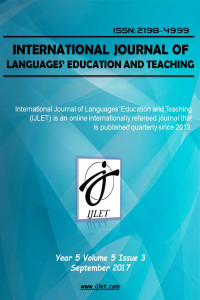Öz
Anahtar Kelimeler
Kaynakça
- Anderman, E. M., & Wolters, C. A. (2006). Goals, Values, and Affect: Influences on Student Motivation. In P. A. Alexander & P. H. Winne (Eds.), Handbook of educational psychology (pp. 369-389). Mahwah, NJ: Lawrence Erlbaum Associates
- Al-Sawalha, Salem, M. A., Chow, & Foo, T. V. (2012). The Effects of Writing Apprehension iin English on the Writing Process of Jordanian EFL Students at Yarmouk University. International Interdisciplinary Journal of Education, 1 (1), 6-14.
- Cahyono, B.Y. (2009). Technique in Teaching EFL Writing Practical Guides for English Teachers of SMP/MTs in Indonesia. Malang State University of Malang.
- Casanave, C. P. (2004). Controversies in Second Language Writing: Dilemmas and Decisions in Research and Instruction . Ann Arbor, MI: University of Michigan
- Chiramanee, T & Kulprasit, W. (2014).Journal Writing with Peer Feedback: A Friend or A Foe for EFL Learners. International Journal of English Language Education. 2 (2), 142-153
- Erkan D.Y, & Saban, A.I. (2011). Writing Performance Relative to Writing Apprehension, Self-Efficacy in Writing, and Attitudes towards Writing: A Correlational Study in Turkish Tertiary-Level EFL. EFL Asian Journal, March 2011 first quarterly, 164-192
- Fakeye, D. (2010). Students’ Personal Variables As Correlates of Academic Achievement In English As A Second Language in Nigeria. Journal of Social Sciences, 22(3), 205-211.
- Flower, L & Hayes, J. R. (1981). A Cognitive Process Theory of Writing. College Composition and Communication 32 (4).
- García, J. N & Fidalgo, R. (2008). Writing Self-efficacy Changes after Cognitive Strategy Intervention in Students with Learning Disabilities: The Mediational Role of Gender in Calibration. The Spanish Journal of Psychology 2008, 11 (2), 414-432
- Graham, S., Berninger, V & Fan, W. (2007). The Structural Relationship between Writing Attitude and Writing Achievement in First and Third Grade Students. Contemporary Educational Psychology, 32, 516-536.
Öz
The way the students feel about writing may affect how well they accomplish the writing task. To write well and to achieve the maximum performance in writing, the students need to have positive attitude toward it so that they can find solutions and strategies whenever they face writing problems. The purpose of the study is to describe the students’ writing attitude toward writing in English and to find out their opinion and feeling toward writing. The present study uses mixed method design, by using survey to get quantitative data and interview to get qualitative data. The instruments used were questionnaires and interview. The data was taken by using systematic random sampling which results in 101 respondents from a state junior high school situated in the rural area of a small town of Pasuruan, East Java, Indonesia.The finding of the research shows that the Eighth Grade Students’ writing attitude toward writing in English was positive and in moderate level (82.12%). The students were sufficiently confident about their writing and viewed writing as a fun activity and an enjoyable experience. Although the students’ attitude fall in the moderate category, they confessed that they had problems in writing, such as the linguistics problem, and the psychological problem.
Anahtar Kelimeler
Kaynakça
- Anderman, E. M., & Wolters, C. A. (2006). Goals, Values, and Affect: Influences on Student Motivation. In P. A. Alexander & P. H. Winne (Eds.), Handbook of educational psychology (pp. 369-389). Mahwah, NJ: Lawrence Erlbaum Associates
- Al-Sawalha, Salem, M. A., Chow, & Foo, T. V. (2012). The Effects of Writing Apprehension iin English on the Writing Process of Jordanian EFL Students at Yarmouk University. International Interdisciplinary Journal of Education, 1 (1), 6-14.
- Cahyono, B.Y. (2009). Technique in Teaching EFL Writing Practical Guides for English Teachers of SMP/MTs in Indonesia. Malang State University of Malang.
- Casanave, C. P. (2004). Controversies in Second Language Writing: Dilemmas and Decisions in Research and Instruction . Ann Arbor, MI: University of Michigan
- Chiramanee, T & Kulprasit, W. (2014).Journal Writing with Peer Feedback: A Friend or A Foe for EFL Learners. International Journal of English Language Education. 2 (2), 142-153
- Erkan D.Y, & Saban, A.I. (2011). Writing Performance Relative to Writing Apprehension, Self-Efficacy in Writing, and Attitudes towards Writing: A Correlational Study in Turkish Tertiary-Level EFL. EFL Asian Journal, March 2011 first quarterly, 164-192
- Fakeye, D. (2010). Students’ Personal Variables As Correlates of Academic Achievement In English As A Second Language in Nigeria. Journal of Social Sciences, 22(3), 205-211.
- Flower, L & Hayes, J. R. (1981). A Cognitive Process Theory of Writing. College Composition and Communication 32 (4).
- García, J. N & Fidalgo, R. (2008). Writing Self-efficacy Changes after Cognitive Strategy Intervention in Students with Learning Disabilities: The Mediational Role of Gender in Calibration. The Spanish Journal of Psychology 2008, 11 (2), 414-432
- Graham, S., Berninger, V & Fan, W. (2007). The Structural Relationship between Writing Attitude and Writing Achievement in First and Third Grade Students. Contemporary Educational Psychology, 32, 516-536.
Ayrıntılar
| Birincil Dil | İngilizce |
|---|---|
| Konular | İkinci Bir Dil Olarak İngilizce |
| Bölüm | Araştırma Makalesi |
| Yazarlar | |
| Yayımlanma Tarihi | 30 Eylül 2017 |
| Yayımlandığı Sayı | Yıl 2017 Cilt: 5 Sayı: 3 |

